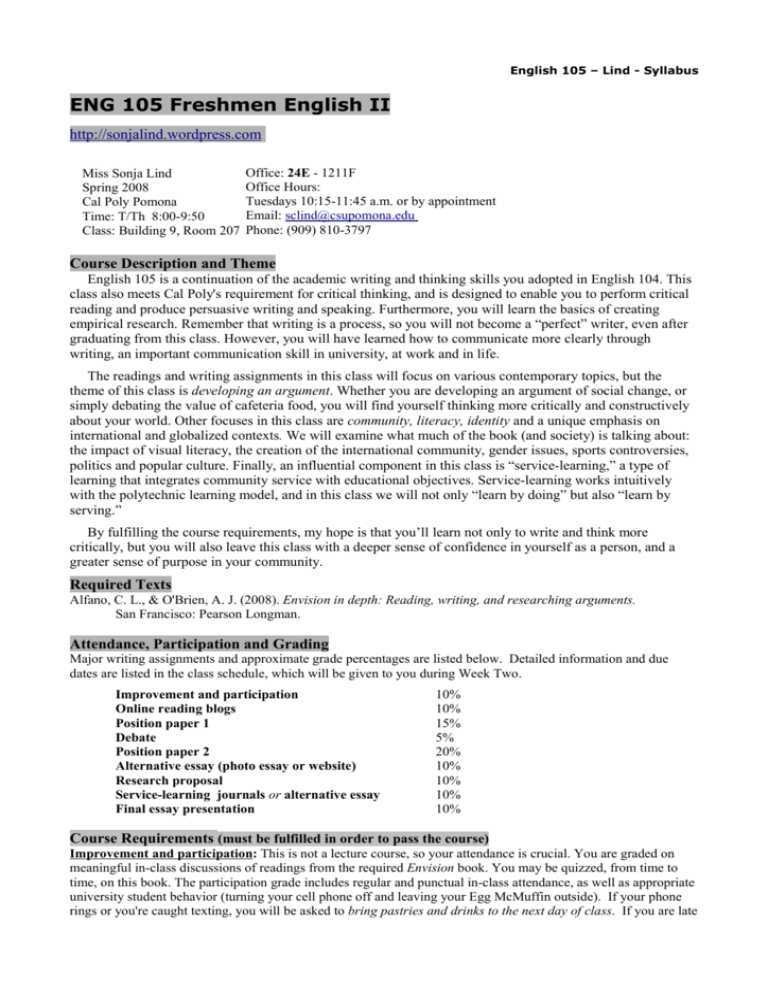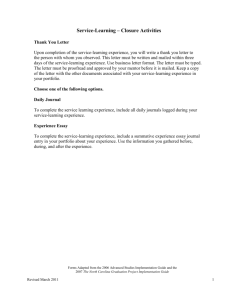
English 105 – Lind - Syllabus
ENG 105 Freshmen English II
http://sonjalind.wordpress.com
Miss Sonja Lind
Spring 2008
Cal Poly Pomona
Time: T/Th 8:00-9:50
Class: Building 9, Room 207
Office: 24E - 1211F
Office Hours:
Tuesdays 10:15-11:45 a.m. or by appointment
Email: sclind@csupomona.edu
Phone: (909) 810-3797
Course Description and Theme
English 105 is a continuation of the academic writing and thinking skills you adopted in English 104. This
class also meets Cal Poly's requirement for critical thinking, and is designed to enable you to perform critical
reading and produce persuasive writing and speaking. Furthermore, you will learn the basics of creating
empirical research. Remember that writing is a process, so you will not become a “perfect” writer, even after
graduating from this class. However, you will have learned how to communicate more clearly through
writing, an important communication skill in university, at work and in life.
The readings and writing assignments in this class will focus on various contemporary topics, but the
theme of this class is developing an argument. Whether you are developing an argument of social change, or
simply debating the value of cafeteria food, you will find yourself thinking more critically and constructively
about your world. Other focuses in this class are community, literacy, identity and a unique emphasis on
international and globalized contexts. We will examine what much of the book (and society) is talking about:
the impact of visual literacy, the creation of the international community, gender issues, sports controversies,
politics and popular culture. Finally, an influential component in this class is “service-learning,” a type of
learning that integrates community service with educational objectives. Service-learning works intuitively
with the polytechnic learning model, and in this class we will not only “learn by doing” but also “learn by
serving.”
By fulfilling the course requirements, my hope is that you’ll learn not only to write and think more
critically, but you will also leave this class with a deeper sense of confidence in yourself as a person, and a
greater sense of purpose in your community.
Required Texts
Alfano, C. L., & O'Brien, A. J. (2008). Envision in depth: Reading, writing, and researching arguments.
San Francisco: Pearson Longman.
Attendance, Participation and Grading
Major writing assignments and approximate grade percentages are listed below. Detailed information and due
dates are listed in the class schedule, which will be given to you during Week Two.
Improvement and participation
Online reading blogs
Position paper 1
Debate
Position paper 2
Alternative essay (photo essay or website)
Research proposal
Service-learning journals or alternative essay
Final essay presentation
10%
10%
15%
5%
20%
10%
10%
10%
10%
Course Requirements (must be fulfilled in order to pass the course)
Improvement and participation: This is not a lecture course, so your attendance is crucial. You are graded on
meaningful in-class discussions of readings from the required Envision book. You may be quizzed, from time to
time, on this book. The participation grade includes regular and punctual in-class attendance, as well as appropriate
university student behavior (turning your cell phone off and leaving your Egg McMuffin outside). If your phone
rings or you're caught texting, you will be asked to bring pastries and drinks to the next day of class. If you are late
English 105 – Lind - Syllabus
because of traffic or an alarm clock malfunction, I am reasonably lenient but please contact me at (909) 810-3797.
Remember not to call after 11 p.m. or before 8:00 a.m. Repeated lateness and/or absences will result in a lowering
of the course grade by as much as a full grade or more (e.g., from a “B” to a “C”).
Online reading blogs: This class is a “hybrid” class, which means that you will spend much of your time in class
as well as online. You will be asked to submit group reading blogs weekly on the class website
http://sonjalind.wordpress.com. At the start of the quarter, you will be placed in a three- or four-student group, and,
each week, in response to assigned readings from either required book, you will post: 1) one unique and thoughtprovoking question on the reading(s) that shows a depth of understanding of the text(s); and 2) a thoughtful
response to one of your classmate's questions. You should post your question every week before Wednesday
midnight on your group's page, and by Thursday midnight you should post your response to one of the questions.
When this process has been completed successfully by each member of the group, the group will receive a full
point. We may discuss the same readings in class before or after you have posted your reading blog. You will be
working with a partner or in a group frequently during this quarter, so remember to communicate clearly with
your classmates. You may want to get their phone numbers and/or email addresses.
Persuasive writing: Two of the most important pieces of writing you will produce this quarter are the position
papers, otherwise called “argument papers,” “persuasive papers,” and so on. In these essays, you will be arguing
for a unique position (see Envision, pp. 67-78 for details). Feedback and revision are essential and required for
these papers; not only will you write multiple drafts, but you will need to take those drafts to receive advice either
from the University Writing Center (Building 1, Room 220), Learning Resource Center (Building 13) or me
(Building 24E, Room 1211F). However, you will also be required to posit your argument through an alternative,
more creative format, choosing between a photo essay or website (see Envision, pp. 194-202 for details).
Persuasive speaking: It shouldn't be a surprise that the art of persuasion is required of a critical thinker. Likewise,
it shouldn't be a new idea that public speaking is part of many persuasive skills required. In this class, you will not
only write but speak. At the drafting stage of your second position paper, you will sign up for a short presentation
(details announced later) of the main points of your essay. With the entire class, you will also prepare for and
deliver a debate, a favorite assignment of all of my former classes. Your service-learning project, should you
choose to become involved, will also necessitate a presentation at the end of the quarter. Last of all, your final
assignment in this class will be to present your final essay, which I will give you more details about in Week Ten.
Research writing: Because research is a necessary part of any discipline, you will write several research and
research-related assignments, including: 1) a community observation journal; 2) an annotated bibliography;
and 3) a research proposal. We will also have one or two library information sessions and you will be asked to
take notes of sources for your research proposal. Most of the assignments allow you to work collaboratively, as you
would do in a genuine research scenario. During these assignments, receiving feedback is encouraged. In fact, you
are required to make at least one visit to the University Writing Center (Building 1, room 220), Learning Resource
Center (Building 13), or my office (Building 24E, room 1211F). You should bring your written work on these
visits.
Service-learning project: In this class, you will have the choice to become involved in a minimum of 10 hours of
service, of which you'll have some options. The two primary options (and I strongly encourage the first) for
service-learning in this class are:
Meeting with an international student from the Cal Poly English Language Institute (CPELI) and:
Tutoring that student in practical writing skills, such as email writing, resume writing, application
writing and introductory essay writing
Mentoring that student, helping him or her acculturate to American academic practices
TIME: Once or twice a week for an hour, schedule and location variable
Attending Fourth Saturday Family Fun Days at the Cal Poly Downtown Center, and, among other things:
Reading aloud to children attending
Greeting visitors at the door
Helping with setting up and cleaning up
TIME: Five hours each Saturday, between noon and 5:00 p.m.
You will need to record your service in a journal, which will be submitted to me in class on June 3. You will also give a
presentation on your service-learning experience on June 3 or June 5 (if necessary). If you do not choose to experience
service-learning, you will have to write a 10-page paper, which you are free to discuss with me at any time.
English 105 – Lind - Syllabus
Technical Requirements
Frequent access to a computer with Internet is essential.
Frequent access to an email account which I can contact you at (contact me at sclind@csupomona.edu).
All major submitted written work (e.g. your final paper) must be typed if submitted in person, and saved as
an Adobe Reader (.pdf) file if submitted electronically. No .doc, .docx or .wps files accepted.
Other Necessary Information
Late or Incomplete Work: No late papers will be accepted without a valid excuse. Likewise, if you are absent on
the day of the debate or a draft workshop session, you will not be given credit; your absence at the final essay
presentation day (even if you are not presenting on that day) will result in the lowering of the course grade by as
much as a full grade or more. If you encounter technical difficulties with a printer or computer, submit your
assignment (except online assignments) in handwritten form. I suggest that you plan ahead, since there are a lot of
appointments to observe in this class, and it is an excellent idea to start keeping those dates in an academic planner
if you do not do so already.
Plagiarism: Plagiarized papers or presentations – work that borrows or quotes words or ideas of another
writer without giving correct citation – will be failed, which will directly affect your course grade. There
are obviously some exceptions to this, because you are encouraged to write collaboratively in this class, but
in those cases, you must include your classmate's or classmates' name(s) on the title page, along with your
own. There are other assignments, however, where you are required to write by yourself, and cite any
sources you find. Even if you are working with a partner on your research proposal, you still need to cite
any quotes or unique ideas. When in doubt, cite! If you don't know what plagiarism or “correct citation” is,
please refer to the Cal Poly Catalog and come talk to me. I have caught, on average, one person a quarter
who has plagiarized a paper – just a warning – and each student has regretted it.
Grading Scale
A: 94-100 %
A-: 90-93.9 %
B+: 86-89.9 %
B: 83-85.9 %
B-: 80-82.9 %
C+: 76-79.9 %
C: 73-75.9 %
C-: 70-72.9 %
A failing grade is below 60%. Grading is not done on the curve.
D+: 66-69.9 %
D: 63-65.9 %
D-: 60-62.9 %

![Submission 68 [doc]](http://s3.studylib.net/store/data/008000926_1-fed8eecce2c352250fd5345b7293db49-300x300.png)





